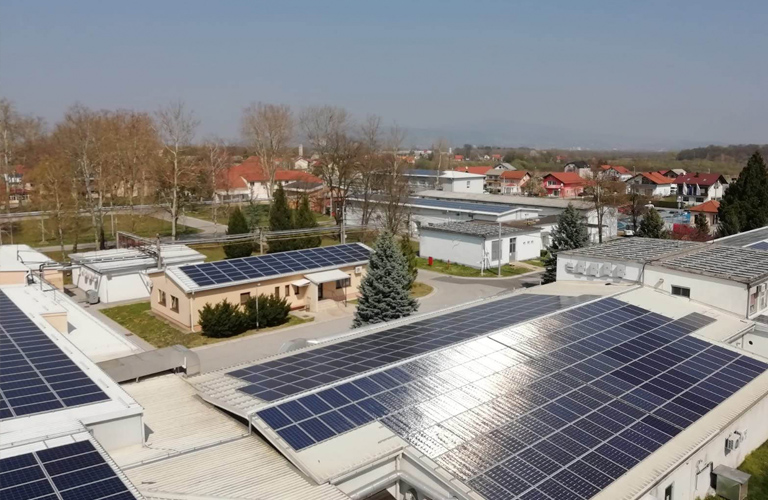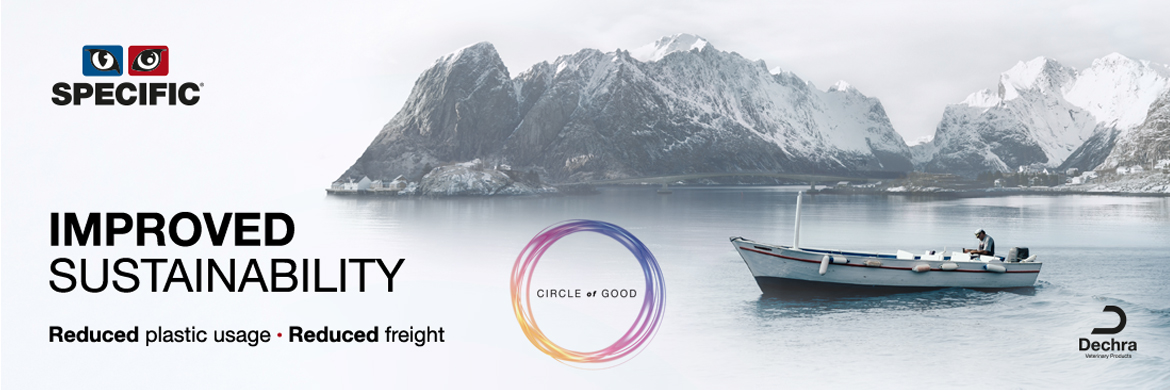Key Facts:
- 5,540 photovaltic panels installed in Zagreb
- Reduce CO2 emissions per DSC Shipment
4.9%
Reduction in CO2 per kg
(DSC shipments)
100%
Certified fish in
dry cat diets
Minimise our Environmental Footprint
The Group recognises the importance of good environmental controls. It is the Group’s policy to comply with environmental legislation currently in place, to adopt responsible environmental practices and to give consideration to minimising the impact of its operations on the environment.
Annual Waste Disposal Performance at DPM
| Bladel | Florida | Skipton | Zagreb |
|---|
| 2019 | 2018 | 2019 | 2018 | 2019 | 2018 | 2019 | 2018 |
|---|
| Recovered, recycled and reused | 100% | 100%* | 31.0% | 32.0% | 100%** | 83.5% | 44.0% | 95.8% |
| Landfill | – | – | 69.0% | 68.0% | – | – | 41.0%*** | – |
| Waste & Controlled Drugs | – | – | – | – | – | 16.5% | 15.0% | 4.2% |
* Recycled.
** 47.7% is recovered and 52.3% is recycled.
*** The increase was due to the removal of asbestos from the majority of the roofs at the Zagreb facility.
Our central logistics hub for Europe (the DSC) has continued with its annual contribution of DKK15,000 to Energreen ApS for the construction of new green energy production facilities within Denmark.
Optimise the Energy Used
Greenhouse Gas Emissions
In order to determine our carbon emissions, we have used the GHG Protocol Corporate Accounting and Reporting Standard and have reported on emissions arising from those sources over which we have operational control (the exception being the inclusion of a third party manufacturer who leases part of our facility in Uldum, Denmark). Any acquisitions during the year are included from the first full month that they become part of the Dechra Group. The disclosures below encompass:
- Scope 1: includes emission from combustion of fuel and operation of facilities (excluding combustion of fuel from company cars);
- Scope 2: includes emissions from purchased electricity, heat, steam and cooling; and
- Vehicle emissions.
Dechra has selected ‘Tonnes of CO2e per total £ million sales revenue’ as the intensity ratio as this is a relevant indicator of the Group’s growth.
| 1 July 2018 to 30 June 2019
£m | 1 July 2017 to 30 June 2018
£m | 1 July 2016 to 30 June 2017
£m |
|---|
| Scope 1 | 5,554 | 3,819 | 4,018 |
| Scope 2 | 3,712 | 3,463 | 3,890 |
| Vehicle emissions | 2,209 | 1,703 | 1,618 |
| Total Carbon Footprint (tonnes of CO2e) | 11,475 | 8,985 | 9,526 |
| Intensity ratio (tonnes of CO2e per £m) | 23.8 | 22.1 | 26.5 |
As reported in last year’s report, the main contributor to Scope 1 is the production of the nutrition supplement that is manufactured at Genera. This was explained in a case study in the 2016 Annual Report. This site has plans to reduce its carbon footprint by installing solar panels as detailed in the case study on the following page.
The intensity ratio has increased by 1.7 tonnes of CO2e per total £ million sales revenue. The increase is partially due to the increase in vehicle emissions (0.4 tonnes of CO2e per total £ million sales revenue), and mainly due to the additional manufacturing facility in Brazil. During the forthcoming year, the Brazilian business will assess its emissions and identify equipment or processes that could be replaced or improved.
The Group has continued with its policy of replacing all non-LED lighting within its control over the next four years, and has installed 450 LED lighting units at the Zagreb facility, which represents 15% of the internal lighting units. The Northwich Head Office has moved to green tariff energy.
As reported in last year’s Annual Report, the installation of the 5,540 photovoltaic (PV) panels have been fitted onto the existing roof structures across the Zagreb site. This is the largest installation of its type in Croatia, and has been in full operation since 28 June 2019. Any surplus electricity is distributed to the municipal electrical grid.
Sustainable Raw Materials in Our Nutrition Range
The raw materials of our dry diets are reviewed on a yearly basis for scarcity, and, if scarce, we endeavour to find an alternative raw material. Our focused action on the fish raw materials has resulted in the use of 100% certified fish in the dry cat diets from January 2018. In addition, as part of our environmental road map, we have rationalised our pack sizes which has reduced our use of plastic.
Eco-friendly and Financially Cost-Effective Distribution Systems
The transportation of goods is the largest activity for DSC. They handled 79,300 orders this year, an increase of 28.8%, to customers worldwide as well as receiving and storing approximately 1,500 full truck deliveries. Although the cost of transport is the predominant factor for choice of transportation, DSC has reviewed the method of transportation to find a form of transportation with the lowest carbon footprint.
The majority of the pharmaceutical products received by DSC are supplied from our manufacturing sites in Bladel, the Netherlands and Skipton, the UK. The products from Bladel are transported by road, whereas the products from UK are shipped by sea and road.

Products are shipped to our customers by road, air and sea. As the majority of the customers are based in Europe, road transportation is the main method. The following table shows the CO2 emission for this form of transportation:
| 2019 | 2018 |
|---|
| Shipments | 36,905 | 30,409 |
| Total Weight (GRT) | 19,399,330 | 16,665,247 |
| CO2 Outlet (kg) | 1,670,037 | 1,393,046 |
| CO2 per kg | 11.6 | 12.2 |
The increase in shipments, 36,905 in 2019 compared to 30,409 in 2018, is mainly due to the increase in inventory following the Le Vet acquisition and the transfer of products from distributors to Dechra marketing companies. This has resulted in an increase in the CO2 gross outlet figure, however, the CO2 per kg is lower as the size of each shipment was larger. In addition, the optimisation of the pack sizes for the Nutrition products and the packing into cartons has resulted in the pallets being more stable and therefore can be double-stacked. We have implemented more efficient packing methods which enables us to include more products in each delivery and therefore reduce our CO2 emissions per delivery.
Reduction in Packaging Materials and Pallets
Historically, pallets of products received have been split for onward delivery which has meant additional packaging being required. However, recently whole pallets of products have been shipped out of DSC reducing the requirement to repackage the pallets and leading to a reduction in packaging costs per order as detailed in the table below:
| 2019 | 2018 | 2017 |
|---|
| Packaging Costs Per Order | £3.05 | £4.40 | £4.25 |
| Reused Pallets | 68.0% | 65.5% | 67.1% |
68% of all pallets used in DSC are reused, and any damaged pallets are sold.
